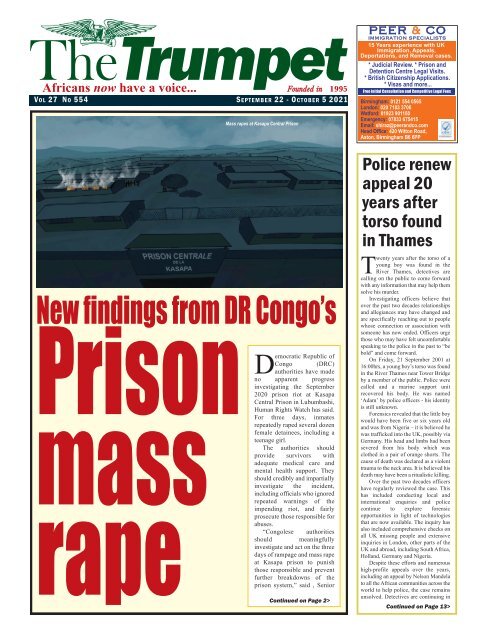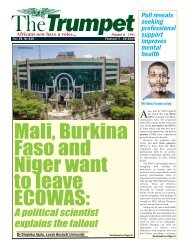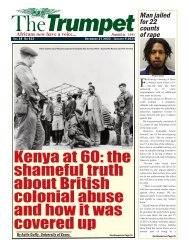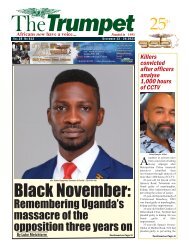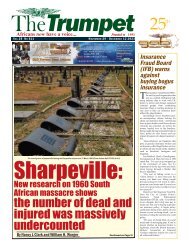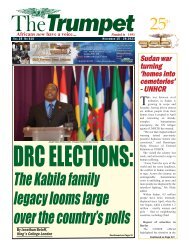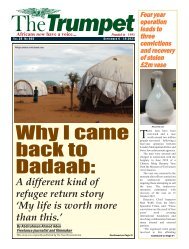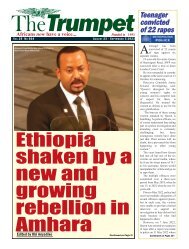The Trumpet Newspaper Issue 554 (September 22 - October 5 2021)
New findings on DR Congo's Prison mass rape
New findings on DR Congo's Prison mass rape
- TAGS
- diaspora africa newspaper uk
- diaspora africa newspaper
- trumpet newspaper
- britain black newspaper
- british black newspaper
- black newspaper uk
- nhs couch to 5k
- tilda rice
- remitix
- mukuru money transfer
- peer and co
- jeffrey wegbe
- thames torso
- adam torso
- prison mass rape
- democratic republic of congo
- dr congo
- african
- kasapa
You also want an ePaper? Increase the reach of your titles
YUMPU automatically turns print PDFs into web optimized ePapers that Google loves.
<strong>The</strong><strong>Trumpet</strong><br />
Africans now have a voice... Founded in 1995<br />
V O L 27 N O <strong>554</strong> S E P T E M B E R <strong>22</strong> - OCTOBER 5 <strong>2021</strong><br />
Mass rapes at Kasapa Central Prison<br />
New findings from DR Congo’s<br />
Prison<br />
mass<br />
rape<br />
Democratic Republic of<br />
Congo (DRC)<br />
authorities have made<br />
no apparent progress<br />
investigating the <strong>September</strong><br />
2020 prison riot at Kasapa<br />
Central Prison in Lubumbashi,<br />
Human Rights Watch has said.<br />
For three days, inmates<br />
repeatedly raped several dozen<br />
female detainees, including a<br />
teenage girl.<br />
<strong>The</strong> authorities should<br />
provide survivors with<br />
adequate medical care and<br />
mental health support. <strong>The</strong>y<br />
should credibly and impartially<br />
investigate the incident,<br />
including officials who ignored<br />
repeated warnings of the<br />
impending riot, and fairly<br />
prosecute those responsible for<br />
abuses.<br />
“Congolese authorities<br />
should meaningfully<br />
investigate and act on the three<br />
days of rampage and mass rape<br />
at Kasapa prison to punish<br />
those responsible and prevent<br />
further breakdowns of the<br />
prison system,” said , Senior<br />
Continued on Page 2><br />
PEER & CO<br />
IMMIGRATION SPECIALISTS<br />
15 Years experience with UK<br />
Immigration, Appeals,<br />
Deportations, and Removal cases.<br />
* Judicial Review. * Prison and<br />
Detention Centre Legal Visits.<br />
* British Citizenship Applications.<br />
* Visas and more...<br />
Free Initial Consultation and Competitive Legal Fees<br />
Birmingham: 0121 <strong>554</strong> 0565<br />
London: 020 7183 3706<br />
Watford: 01923 901150<br />
Emergency: 07833 675415<br />
Email: shiraz@peerandco.com<br />
Head Office: 420 Witton Road,<br />
Aston, Birmingham B6 6PP<br />
Police renew<br />
appeal 20<br />
years after<br />
torso found<br />
in Thames<br />
Twenty years after the torso of a<br />
young boy was found in the<br />
River Thames, detectives are<br />
calling on the public to come forward<br />
with any information that may help them<br />
solve his murder.<br />
Investigating officers believe that<br />
over the past two decades relationships<br />
and allegiances may have changed and<br />
are specifically reaching out to people<br />
whose connection or association with<br />
someone has now ended. Officers urge<br />
those who may have felt uncomfortable<br />
speaking to the police in the past to “be<br />
bold” and come forward.<br />
On Friday, 21 <strong>September</strong> 2001 at<br />
16:00hrs, a young boy’s torso was found<br />
in the River Thames near Tower Bridge<br />
by a member of the public. Police were<br />
called and a marine support unit<br />
recovered his body. He was named<br />
‘Adam’ by police officers - his identity<br />
is still unknown.<br />
Forensics revealed that the little boy<br />
would have been five or six years old<br />
and was from Nigeria – it is believed he<br />
was trafficked into the UK, possibly via<br />
Germany. His head and limbs had been<br />
severed from his body which was<br />
clothed in a pair of orange shorts. <strong>The</strong><br />
cause of death was declared as a violent<br />
trauma to the neck area. It is believed his<br />
death may have been a ritualistic killing.<br />
Over the past two decades officers<br />
have regularly reviewed the case. This<br />
has included conducting local and<br />
international enquiries and police<br />
continue to explore forensic<br />
opportunities in light of technologies<br />
that are now available. <strong>The</strong> inquiry has<br />
also included comprehensive checks on<br />
all UK missing people and extensive<br />
inquiries in London, other parts of the<br />
UK and abroad, including South Africa,<br />
Holland, Germany and Nigeria.<br />
Despite these efforts and numerous<br />
high-profile appeals over the years,<br />
including an appeal by Nelson Mandela<br />
to all the African communities across the<br />
world to help police, the case remains<br />
unsolved. Detectives are continuing in<br />
Continued on Page 13>
Page2 <strong>The</strong><strong>Trumpet</strong> SEPTEMBER <strong>22</strong> - OCTOBER 5 <strong>2021</strong><br />
News<br />
New findings from DR Congo’s<br />
Prison mass rape<br />
Continued from Page 1<<br />
Congo Researcher at Human Rights<br />
Watch. “Almost a year on, rape<br />
survivors are still awaiting adequate<br />
medical care and help as they face<br />
trauma and stigma.”<br />
<strong>The</strong> riot started on <strong>September</strong> 25,<br />
when a group of 15 inmates deemed<br />
dangerous and held separately from the<br />
others, overpowered their only guard<br />
and stormed through the prison. <strong>The</strong>y<br />
incited other prisoners to violence, set<br />
several buildings on fire, and rapidly<br />
took over the prison while staff, guards,<br />
and security forces fled the prison.<br />
A fire in the women’s section forced<br />
the female detainees into the main<br />
prison yard for three days without<br />
protection, shelter, food, water, or safe<br />
access to toilet facilities. Male inmates<br />
burned all the women’s belongings and<br />
imposed a climate of fear. “For fear of<br />
being raped, we wouldn’t even go wash<br />
ourselves,” said a female survivor, 38.<br />
On <strong>September</strong> 28, a group of<br />
prisoners handed over more than 40<br />
inmates – including those who<br />
allegedly led the unrest – to security<br />
forces, who then re-entered the prison.<br />
Although the provincial police chief<br />
urged the authorities Kasapa prison,<br />
which by then was in ruins, only about<br />
200 prisoners out of a total of about<br />
2,000 were subsequently transferred to<br />
other prisons.<br />
From December 2020 to April <strong>2021</strong>,<br />
Human Rights Watch interviewed 42<br />
people, including 14 female survivors<br />
of the unrest, as well as male inmates,<br />
medical and aid workers, local activists,<br />
prison and judicial staff, and United<br />
Nations staff in Lubumbashi and<br />
Kinshasa, the capital. Human Rights<br />
Watch conducted field research at<br />
Kasapa prison in March.<br />
Human Rights Watch reviewed an<br />
internal UN report that found that<br />
security forces shot and killed at least<br />
20 inmates, including at least 7 who<br />
may have been extrajudicially executed<br />
while they were trying to escape<br />
through a dugout tunnel. One prison<br />
guard also died from injuries sustained<br />
during the riot.<br />
Four August 2020 letters signed by<br />
prison officials and addressed to<br />
provincial authorities warned about<br />
insecurity in the prison and requested<br />
the transfer of a group of “very<br />
dangerous inmates.” Prison officials<br />
said that the letters went unanswered.<br />
Warnings of an imminent plot involving<br />
the same group were also ignored five<br />
days before the riot and again just hours<br />
before it started, prison officials said.<br />
Of the 56 female detainees in the<br />
prison, 37 women and a teenage girl<br />
testified to Lubumbashi’s public<br />
prosecutor that male inmates had raped<br />
them. Human Rights Watch interviewed<br />
13 of the detainees who said they had<br />
been sexually assaulted or raped. Prison<br />
staff, UN officials, and local human<br />
rights activists told Human Rights<br />
Watch that the majority of female<br />
inmates, and possibly all, were raped<br />
but some of them did not report the<br />
rapes to the prosecutor for fear of the<br />
stigma associated with sexual assault.<br />
<strong>The</strong>re were also credible reports of rape<br />
of six men and boys.<br />
Some survivors said they were gang<br />
raped or were raped several times by<br />
different men during the three days of<br />
unrest. <strong>The</strong>y said that the women who<br />
resisted were often beaten or hit with<br />
sharp tools and weapons. “Three young<br />
men came toward me with machetes<br />
and knives … and took me behind the<br />
block, threatening to cut my head off if<br />
I resisted,” said a 37-year-old detainee.<br />
“All three of them came on top of me,<br />
and when I tried to resist, one hit me<br />
with a machete, injuring me above my<br />
eye.”<br />
Several sources described an attack<br />
in which numerous inmates raped a<br />
woman visiting a prisoner the day the<br />
riot started, and penetrated her with<br />
sharp objects. Interviewees said that<br />
two other female visitors and a female<br />
police officer were raped. During the<br />
unrest there were also violent clashes<br />
between rival groups of inmates over<br />
the prison’s informal control system.<br />
Medical statistics from the unrest<br />
viewed by Human Rights Watch stated<br />
that at least seven detainees, including a<br />
16-year-old girl, became pregnant, most<br />
likely as a result of being raped during<br />
the unrest. A number had newly<br />
contracted HIV/AIDS and other<br />
sexually transmitted infections.<br />
After the riot, the authorities failed<br />
to provide survivors with timely and<br />
adequate post-rape care, such as<br />
medical care for physical injuries,<br />
emergency contraception against<br />
pregnancy, HIV post-exposure<br />
prophylaxis and medication to prevent<br />
other sexually transmitted infections, as<br />
well as counselling support, Human<br />
Rights Watch said. Despite alerts from<br />
local activists, provincial authorities did<br />
not send a medical team to Kasapa<br />
prison to attend to sexual violence<br />
survivors until December 1, two days<br />
after Radio France Internationale (RFI)<br />
on the rapes.<br />
A Non-Governmental group<br />
provided some post-rape care on<br />
<strong>September</strong> 30, but beyond the 72-hour<br />
required window, and due to the lack of<br />
stock, only half of the women detainees<br />
benefited from it. Others were only<br />
given antibiotics. For at least two weeks<br />
after the riot, all the female detainees<br />
slept in the open, in one of the prison<br />
churches whose roof had collapsed<br />
during the fire.<br />
Between December 2 and 16, the<br />
humanitarian organization - Médecins<br />
Sans Frontières (Doctors Without<br />
Borders, MSF) set up a temporary<br />
clinic inside the prison to treat rape<br />
survivors. <strong>The</strong> Haut-Katanga Provincial<br />
LAND FOR SALE<br />
at Isoko<br />
Estates<br />
Nigeria<br />
Governor, Jacques Kyabula, confirmed<br />
in a letter to Human Rights Watch that<br />
an investigation into the rapes was<br />
ongoing. He did not respond to<br />
inquiries about the unheeded warnings<br />
or the factors that led to the three-day<br />
riot at the prison.<br />
“<strong>The</strong> failure to meaningfully<br />
investigate the Kasapa prison riot is<br />
emblematic of the government’s<br />
longstanding neglect of Congolese<br />
prisons and the people held in them,”<br />
Fessy said. “Congo’s government needs<br />
to adopt measures to uphold the dignity<br />
and security of the inmates and ensure<br />
that everyone, particularly women and<br />
girls, is protected from sexual<br />
violence.”<br />
Kasapa Central Prison<br />
Kasapa Central Prison, built in<br />
1958, has a capacity of 800 inmates. At<br />
the time of the riot, the prison’s<br />
population was nearly 2,000, including<br />
56 women and 53 children, according<br />
to prison authorities. As many as 81<br />
percent of all inmates were still in<br />
Continued on Page 8<<br />
1) ONE (1) Acre of Land (6 Plots) at OKUSHU in OKO-AFO close to AGBARA<br />
and ATAN to ADO-ODO, off BADAGRY Express way. This is an upcoming<br />
residential developing area.<br />
<strong>The</strong> electricity supply from the national grid, is through Agbara. Very dry soil,<br />
Not flood plain (NO FLOOD PROBLEMS) PRICE: N1.5 MILLION.<br />
2) 2 Plots of Land for Sale at ERUKU - OKO-AFO; AGBARA AREA, also, ATAN,<br />
and ADO-ODO, through Badagry Express way, and it also benefits from good<br />
transport systems and national grid is through Agbara and ATAN area.<br />
PRICE: N900,000. Nine Hundred Thousand Naira.<br />
All the above properties are recommended for early grab as we are inaundated<br />
with enquiries, therefore, first come, first served.<br />
PLEASE CALL :- +44 (0)7802 575486 - JOE<br />
PEER & CO<br />
IMMIGRATION SPECIALISTS<br />
15 Years experience with UK<br />
Immigration, Appeals,<br />
Deportations, and Removal cases.<br />
* Judicial Review. * Prison and<br />
Detention Centre Legal Visits.<br />
* British Citizenship Applications.<br />
* Visas and more...<br />
Free Initial Consultation and Competitive Legal Fees<br />
Birmingham: 0121 <strong>554</strong> 0565<br />
London: 020 7183 3706<br />
Watford: 01923 901150<br />
Emergency: 07833 675415<br />
Email: shiraz@peerandco.com<br />
Head Office: 420 Witton Road,<br />
Aston, Birmingham B6 6PP
SEPTEMBER <strong>22</strong> - OCTOBER 5 <strong>2021</strong> <strong>The</strong><strong>Trumpet</strong><br />
Page3
Page4<br />
<strong>The</strong><strong>Trumpet</strong><br />
SEPTEMBER <strong>22</strong> - OCTOBER 5 <strong>2021</strong><br />
<strong>The</strong><strong>Trumpet</strong> Group<br />
News<br />
Police offer £20,000 to find<br />
the killers of Jeffrey Wegbe<br />
Field: 07956 385 604<br />
E-mail:<br />
info@the-trumpet.com<br />
<strong>The</strong><strong>Trumpet</strong>Team<br />
PUBLISHER / EDITOR-IN-CHIEF:<br />
’Femi Okutubo<br />
CONTRIBUTORS:<br />
Moji Idowu, Ayo Odumade,<br />
Steve Mulindwa<br />
SPECIAL PROJECTS:<br />
Odafe Atogun<br />
John-Brown Adegunsoye (Abuja)<br />
DESIGN:<br />
Xandydesigns@gmail.com<br />
ATLANTA BUREAU CHIEF:<br />
Uko-Bendi Udo<br />
3695 F Cascade Road #2140 Atlanta,<br />
GA 30331 USA<br />
Tel: +1 404 889 3613<br />
E-mail: uudo1@hotmail.com<br />
BOARD OF CONSULTANTS<br />
CHAIRMAN:<br />
Pastor Kolade Adebayo-Oke<br />
MEMBERS:<br />
Tunde Ajasa-Alashe<br />
Allison Shoyombo, Peter Osuhon<br />
<strong>The</strong><strong>Trumpet</strong> (ISSN: 1477-3392)<br />
is published in London fortnightly<br />
THINKING<br />
OF<br />
WRITING<br />
A BUSINESS<br />
PLAN?<br />
We can help you develop a<br />
professional business plan<br />
from only £250.<br />
For more information, contact us<br />
at 07402792146 or email us at:<br />
tolu.oyewole@consultant.com<br />
London’s Metropolitan Police are<br />
offering a £20,000 reward to find<br />
the killers of Jeffrey Wegbe who<br />
was fatally shot in Brent last year.<br />
A team of detectives believe the answer<br />
to Jeffrey’s murder could lie within the<br />
community and are urging people who can<br />
help them to make contact.<br />
<strong>The</strong> £20,000 reward is available for<br />
anyone who can provide police with<br />
information leading to the conviction of<br />
Jeffrey’s killers.<br />
Appealing in a social media video,<br />
Detective Inspector James Howarth,<br />
Specialist Crime, said “At 00:20hrs on<br />
Wednesday, 12 August 2020, Jeffrey was<br />
pursued by the occupants of a Silver<br />
Jaguar XF Estate who fatally shot him at<br />
his home address in Brent. He was just 26<br />
years old. I know the vehicle circled the<br />
area before they found and attacked<br />
Jeffrey, in the most cowardly way.”<br />
He added: “Though time has passed,<br />
our determination to catch the people who<br />
brutally attacked Jeffrey remains<br />
undiminished.”<br />
Police were called on Wednesday, 12<br />
August 2020, police were called to reports<br />
of a shooting in Hansel Road, NW6, at<br />
00:20hrs.<br />
Officers attended along with London<br />
Ambulance Service and found Jeffrey with<br />
a gunshot wound to his chest.<br />
Despite the best efforts of paramedics,<br />
he was pronounced dead at the scene.<br />
A post-mortem examination later gave<br />
cause of death as a gunshot wound.<br />
Jeffrey’s family said in a heartfelt<br />
statement: “Our beloved Jeffrey was killed<br />
on that Wednesday morning in what can<br />
only be described as a senseless violent<br />
attack. Understandably, we are distraught<br />
by the news and ask that you keep us all in<br />
your thoughts and prayers. We would also<br />
like to say a huge thank you to our family,<br />
the police and wider community for all<br />
their support.”<br />
DI Howarth added: “Please do not<br />
hesitate to get in touch with us, as you may<br />
hold a significant piece of information that<br />
could help our investigation and get justice<br />
for Jeffrey and his family. Silence only<br />
protects violent criminals, who rely on it<br />
to continue causing bloodshed and misery<br />
in our communities.<br />
“I believe someone in the local<br />
community has information about<br />
Jeffrey’s murder that could be crucial. All<br />
I need is for you to share it. Please do the<br />
right thing and work with us to take the<br />
people involved in serious violent crime<br />
off the streets and put them in jail.”<br />
Anyone with information should call<br />
the Incident Room on 0208 358 0300,<br />
quoting Operational Shadwell.<br />
Alternatively tweet @MetCC or call<br />
101 ref CAD 140/12Aug2020.<br />
Information can be given anonymously<br />
to the independent charity Crimestoppers<br />
on 0800 555 111 or by visiting<br />
crimestoppers-uk.org- though anyone<br />
choosing this method should be mindful<br />
that they would not be eligible for the<br />
£20,000 reward on offer from police.<br />
Bubble In Christ Music Band<br />
For your Music band with<br />
classic rendition for all<br />
occasions, with traditional,<br />
contemporary African<br />
international and Gospel filled<br />
with professional decent<br />
Presentation.<br />
More Musicians, Singers,<br />
Instrumentalists, handy men,<br />
Music directors band coordinators,<br />
Audio and/or video<br />
technicians, Drivers,<br />
Marketing Personnel are<br />
welcome.<br />
Contact: Olugbenga on<br />
07438 264613<br />
CHERUBIM & SERAPHIM MOVEMENT CHURCH<br />
Amazing Grace District -London Branch 2<br />
God’s Promises<br />
never fail:<br />
* Before they call I<br />
will answer; while<br />
they are still<br />
speaking I will hear<br />
(Isaiah 65: 24)<br />
Jeffrey Wegbe coffin<br />
Jeffrey Wegbe<br />
WEEKLY DELIVERANCE SERVICE<br />
Deliverance: Every Wednesday<br />
Time: 6.30pm – 7pm (Individual Prayer & Counselling)<br />
Midweek Church Service: 7pm – 9pm<br />
Venue: Orange Room, Albany <strong>The</strong>atre, Douglas Way,<br />
London SE8 4AG<br />
Other Service: Sunday Thanks giving 11am – 1.30pm<br />
Stolen vehicle used by the suspects<br />
* He will call upon me and I<br />
will answer him: I will be<br />
with him in trouble, I will<br />
deliver him and honour him<br />
(Psalm 91: 15)<br />
For further information, contact - Church Secretary: S/M/I/I (Dr) I Oni-Owoyemi 07788 745231 Or<br />
Church Elders: S/A T Owoyemi 07956 996689 or / M/S/A W Ojomo 07939 836499 or / Apostle T Gbolasere 07484 243990<br />
Email: amazinggracebranch2@gmail.com
SEPTEMBER <strong>22</strong> - OCTOBER 5 <strong>2021</strong> <strong>The</strong><strong>Trumpet</strong><br />
Page5
Page6 <strong>The</strong><strong>Trumpet</strong> SEPTEMBER <strong>22</strong> - OCTOBER 5 <strong>2021</strong>
SEPTEMBER <strong>22</strong> - OCTOBER 5 <strong>2021</strong> <strong>The</strong><strong>Trumpet</strong><br />
Page7
Page8 <strong>The</strong><strong>Trumpet</strong> SEPTEMBER <strong>22</strong> - OCTOBER 5 <strong>2021</strong><br />
News<br />
New findings from DR Congo’s<br />
Prison mass rape<br />
Continued from Page 2<<br />
pretrial detention and among the<br />
women, only five had been convicted.<br />
Contrary to both and international<br />
human rights law, Kasapa prison houses<br />
inmates from both civilian and military<br />
jurisdictions, and it mixes detainees<br />
awaiting trial with convicted prisoners.<br />
Poor hygiene and sanitation,<br />
inadequate food supplies and health<br />
care, , weak security, violence, and a<br />
lack of gender-sensitive rehabilitation<br />
services, including sexual and<br />
reproductive health for women, mirror<br />
across the country.<br />
Under international law, government<br />
authorities have a duty of care for<br />
people in prisons, including an<br />
obligation to protect their rights to life,<br />
health, safety, and security. <strong>The</strong> African<br />
Commission on Human and Peoples’<br />
Rights in its 1995 , calls on African<br />
countries to conform to the<br />
“international norms and standards for<br />
the protection of the human rights of<br />
prisoners.” <strong>The</strong> (the Mandela Rules)<br />
state that prisoners are to be treated<br />
with dignity and have prompt access to<br />
medical attention, and that women be<br />
held in entirely separate premises.<br />
Under the for the treatment of women<br />
prisoners, governments also have an<br />
obligation to ensure services that<br />
respond to the particular needs of<br />
women and children, including genderspecific<br />
healthcare services at least<br />
equivalent to those available in the<br />
community. <strong>The</strong> African Commission<br />
on Human and Peoples’ Rights and the<br />
International Covenant on Civil and<br />
Political Rights governments to<br />
investigate and appropriately punish<br />
those responsible for abuses against<br />
people in custody, including sexual and<br />
gender-based violence, and provide<br />
reparations for victims.<br />
Unheeded Warnings<br />
Human Rights Watch found that<br />
provincial military and civilian<br />
authorities had been repeatedly warned<br />
about insecurity and the threat posed by<br />
certain inmates at Kasapa Central<br />
Prison. Sources both inside and outside<br />
the prison said that tensions had been<br />
simmering for months with rival gangs<br />
of prisoners engaged in a power<br />
struggle. Security and order in the<br />
prison rely on a “kapita” system, in<br />
which prison authorities informally<br />
cede to prisoners some administrative<br />
and disciplinary powers. <strong>The</strong> head<br />
kapita is generally supported by two<br />
deputies. Rivalries for control escalated<br />
throughout 2020.<br />
In letters on August 4, 19, and 25,<br />
the Penitentiary Inspector commanding<br />
Kasapa’s military section alerted senior<br />
military magistrates and Penitentiary<br />
officials in both Lubumbashi and<br />
Kinshasa about ongoing “security<br />
instability” within the prison. He<br />
requested the transfer of “11 very<br />
dangerous inmates” to a high-security<br />
detention center to address the problem.<br />
<strong>The</strong> prisoners, who had been convicted<br />
for criminal conspiracy, illegal<br />
possession of weapons of war, and<br />
insurrection, were “trying to escape at<br />
all costs,” the August 25 letter read.<br />
On August 29 the Prison Director,<br />
Pelar Ilunga, wrote to the Provincial<br />
Interior Minister, the Provincial<br />
Governor, and military and judicial<br />
authorities, insisting on the need to<br />
transfer dangerous detainees for<br />
security reasons.<br />
None of the four letters were<br />
answered. Officials at Kasapa prison<br />
are not authorized to initiate prison<br />
transfers.<br />
Ilunga confirmed that on <strong>September</strong><br />
21, other prisoners informed him that a<br />
group of convicts were planning to<br />
escape. He said that he alerted the<br />
Provincial Interior Minister via text<br />
messages. On <strong>September</strong> 25, the same<br />
group was caught plotting a prison<br />
break that included burning mattresses<br />
and stealing weapons from police<br />
guards, a prison clerk said. Ilunga<br />
placed the 15 prisoners in a separate<br />
confinement cell, adding that he passed<br />
this information to provincial<br />
authorities. <strong>The</strong> group included the 11<br />
mentioned in the August 25 letter,<br />
according to the Inspector commanding<br />
Kasapa’s military section.<br />
<strong>The</strong> Riot<br />
On <strong>September</strong> 25 at about 4pm, the<br />
15 prisoners who had been placed in a<br />
disciplinary cell just hours earlier,<br />
overpowered their sole guard and<br />
escaped. As they stormed through the<br />
prison, more inmates joined them as<br />
they stole field tools such as machetes,<br />
spades, and hoes from a storage facility<br />
to use as weapons. Rioters then set the<br />
administration building on fire, looted<br />
the clinic and a food depot, and burned<br />
both structures as well.<br />
Amid the chaos, guards, who are<br />
unarmed, fled the premises while some<br />
prison staff were trapped in offices.<br />
<strong>The</strong> military section Commander<br />
entered the prison around 5pm with<br />
armed police. <strong>The</strong>y rescued trapped<br />
prison staff, including the<br />
Commander’s deputy who had been<br />
severely beaten and later died from his<br />
injuries, and female guards who were<br />
hiding in the women’s quarters.<br />
Prisoners confirmed that security<br />
forces used teargas to force inmates<br />
back into their cellblock but were<br />
unable to keep them inside. Inmates<br />
retaliated, burning more sections of the<br />
prison.<br />
Ilunga arrived on site around 6pm,<br />
shortly after the police and military<br />
reinforcements. <strong>The</strong> kapita and his<br />
deputies were taken to safety outside<br />
the prison and, being prisoners<br />
themselves, were held in a cell at the<br />
Prosecutor’s office in Lubumbashi until<br />
order was restored at the prison. At least<br />
two women detainees told Human<br />
Rights Watch that they had begged the<br />
Prison Director to take them to safety<br />
outside the prison, but that he and the<br />
security force personnel refused. “We<br />
were crying but [the Prison Director]<br />
said he couldn’t take us out of the<br />
prison because some women were<br />
convicted for murder,” one woman<br />
said. Ilunga told Human Rights Watch<br />
that he did not have the logistical means<br />
to evacuate the women’s section.<br />
As the unrest grew in intensity,<br />
security forces and prison officials<br />
turned off power and shut the prison<br />
gates behind them, effectively leaving<br />
inmates in control of the prison.<br />
Three days later, on <strong>September</strong> 28,<br />
a group of prisoners eventually put<br />
down the unrest and took control. <strong>The</strong>y<br />
detained at least 40 inmates, including<br />
those who allegedly led the riot, tied<br />
them up, and handed them over to<br />
security forces.<br />
On <strong>October</strong> 7, the Haut-Katanga<br />
province police chief, Gen. Louis<br />
Segond Karawa, that Kasapa prison<br />
should be entirely emptied because it<br />
did not meet any security standards<br />
following the violent events. Karawa<br />
said: “We have nearly 60 women<br />
inmates [at Kasapa] and juveniles who<br />
are vulnerable; one sees what happens<br />
if we leave them among all these men<br />
and criminals. I demand that we<br />
transfer everyone [somewhere else]<br />
while we see how to rebuild this prison<br />
because in its current state, we can’t<br />
even refurbish it.”<br />
In the two weeks that followed the<br />
uprising, about 200 inmates were<br />
transferred to Likasi’s Buluo prison. On<br />
<strong>October</strong> 15, five convicted women were<br />
transferred to Boma prison, also in<br />
Likasi. Fifty soldiers have since been<br />
assigned to securing Kasapa prisons<br />
outside perimeter.<br />
Sexual Violence<br />
Over the course of three days,<br />
female detainees were repeatedly raped,<br />
sometimes by several male inmates<br />
taking turns, and at least one woman<br />
was penetrated with objects. Once the<br />
female prison section had been set on<br />
fire, the female detainees called for help<br />
to escape. Shortly after, the rapes began<br />
and continued while the female<br />
detainees slept in the prison yard.<br />
Ruth, 28, who like all survivors<br />
quoted is identified by a pseudonym to<br />
protect her safety, said that several men<br />
raped her on the first and second nights<br />
of the riot: “It was around 11pm each<br />
time. <strong>The</strong>re were so many of them that<br />
I can’t tell you the exact number. <strong>The</strong>y<br />
rushed over me, each of them wanted to<br />
take their turn.”<br />
Inmates carrying sticks and knives<br />
would choose women detainees in the<br />
yard and rape them either on the spot or<br />
in a more isolated corner. Amina, 38,<br />
said: “I went to urinate in the gutter<br />
when men came up to me and grabbed<br />
me by force. <strong>The</strong>re were many of them,<br />
with machetes, iron bars, and knives …<br />
<strong>The</strong>y had me walk to the back garden<br />
and raped me there.”<br />
Francine, 34, was carrying her<br />
newborn baby on her back and taking<br />
care of her three-year-old daughter<br />
when prisoners assaulted her and two<br />
other women. “It was on the first night;<br />
three men came for my daughter, but I<br />
protected her,” she said. “<strong>The</strong>y took me<br />
instead, with two other women; my<br />
baby fell off my back and they raped<br />
the three of us. <strong>The</strong>y told us not to look<br />
at them or they would hit us.”<br />
Some women said that more than 10<br />
inmates raped them on the first night.<br />
that they were raped by five, ten, or up<br />
to twenty inmates. If a woman resisted,<br />
the men would call others to come and<br />
rape them to punish them, according to<br />
a UN report.<br />
In some cases, male inmates forced<br />
women to strip naked and protest in<br />
front of the prison gates to demand the<br />
release of prisoners.<br />
Human Rights Watch received<br />
credible reports of up to six cases of<br />
prisoners raping male inmates but could<br />
not speak directly with any male<br />
survivors. At least six teenage boys,<br />
ages 14 to 17, may have also been raped<br />
by male inmates, according to the UN,<br />
but Human Rights Watch could not<br />
corroborate the allegations.<br />
Physical and Psychological<br />
Trauma<br />
Women detainees said that staying<br />
on prison grounds where they had<br />
endured sexual violence forced them to<br />
constantly relive their horrific ordeal.<br />
Several survivors reported symptoms<br />
consistent with post-traumatic stress,<br />
including nightmares, insomnia, and<br />
Continued on Page 11
SEPTEMBER <strong>22</strong> - OCTOBER 5 <strong>2021</strong> <strong>The</strong><strong>Trumpet</strong><br />
Page9
Page10 <strong>The</strong><strong>Trumpet</strong> SEPTEMBER <strong>22</strong> - OCTOBER 5 <strong>2021</strong><br />
· #YouCanAdopt is a nationwide adopter<br />
recruitment campaign, which, aims to<br />
raise awareness of adoption and tackle<br />
myths around who is eligible to adopt<br />
· Black, Asian and Mixed Ethnicity<br />
children wait longer to be placed for<br />
adoption than their White counterparts,<br />
with fewer than 5% of adopters in<br />
England coming from a Black, Asian or<br />
Minority Ethnic background<br />
· New film features Black adoptive<br />
parents sharing their experiences<br />
alongside a social worker explaining<br />
the adoption process<br />
https://youtu.be/A5wdrDZPjRU<br />
Adoption<br />
#YouCanAdopt: Adoptive parents<br />
share experiences in lead up to Black<br />
History Month<br />
With Black, Asian and Mixed<br />
Ethnicity children waiting<br />
longer to be placed for adoption<br />
than their White counterparts, and fewer<br />
than 5% of adopters in England coming<br />
from a Black, Asian or Minority Ethnic<br />
background, the #YouCanAdopt campaign<br />
has relaunched to acknowledge and<br />
celebrate adopters from the Black<br />
community while encouraging more<br />
people to consider adoption.<br />
Despite the large majority of Black<br />
people having positive and altruistic views<br />
towards adoption, there are still a number<br />
of barriers and misconceptions that can<br />
prevent people from taking the next step.<br />
This includes concerns around inadequate<br />
finances or housing, being considered too<br />
old, and worries about marital status (being<br />
single or unmarried).<br />
However, motivations regarding<br />
adoption are overwhelmingly positive<br />
among the Black community, and an<br />
increasing number of people successfully<br />
tackle these myths and provide children<br />
with a loving, safe, and stable home.<br />
In the lead up to Black History Month,<br />
a new film released by the #YouCanAdopt<br />
campaign celebrates adopters from the<br />
Black community talking about their<br />
journey and their thoughts on why more<br />
Black people should adopt Black or<br />
Mixed-heritage children.<br />
<strong>The</strong> film highlights the importance of<br />
Black children having Black role models<br />
they can look up to, who’ll guide them<br />
through life. Jacqui, who adopted her<br />
daughter as a single parent, says “Mervielle<br />
came to me really needing a family to love<br />
her, and that’s what we did. When you’ve<br />
got a young Black person growing up, they<br />
need to understand how to be able to<br />
navigate through society, and who better to<br />
help and support these young people than<br />
us, who’ve already been through it?”<br />
Azumah, who adopted her son Kwame<br />
in her 50s following unsuccessful IVF<br />
treatment and a hysterectomy, says “<strong>The</strong><br />
best thing about adopting for us is that we<br />
now have this giggling, singing child<br />
running around the house. He is a happy<br />
and affectionate young boy who brings us<br />
great joy. I feel very proud being his mum<br />
and am thankful for this wonderful<br />
experience.”<br />
Pearl, who was already a mother to<br />
twin boys when she decided to adopt her<br />
daughter, says, “<strong>The</strong>re are hundreds of<br />
thousands of Black and mixed-heritage<br />
children in the social care system in need of<br />
a family. I urge people in my community<br />
to step forward and make a difference. <strong>The</strong><br />
rewards are plenty. Adopting my daughter<br />
was one of the best things I have ever<br />
done.” She explains. “I always tell my<br />
daughter, I didn’t push you out of my<br />
stomach - I pushed you out of my heart.”<br />
Amara, Pearl’s adopted daughter, is<br />
now at University studying International<br />
Business and Mandarin. “My parents were<br />
always open about my adoption, and from<br />
an early age would constantly reassure me<br />
that it was nothing to be ashamed of,” says<br />
Amara. “<strong>The</strong>y would encourage me to ask<br />
questions whenever I felt confused, low, or<br />
just wanted to learn more about my<br />
adoption journey. Being so transparent<br />
with my family really strengthened our<br />
relationship, and I grew up feeling wanted,<br />
loved and secure.”<br />
Sherifa, who has worked in social care<br />
since 2003, highlights that since 2014, the<br />
adoption process has become easier and<br />
shorter and is now split into a two-stage<br />
process that spans across six months.<br />
Though this may still seem like a long time<br />
for some, Sherifa explains that the process<br />
is worth it. “Adoption is a route to<br />
parenthood, and as a Social Work<br />
practitioner, nothing gives me more joy<br />
than seeing the lives of children<br />
transformed for the better despite obstacles<br />
and an adverse start in life.”<br />
<strong>The</strong>re are children all over England<br />
who are looking for loving parents and<br />
homes. For Black children, who are<br />
overrepresented in the care system, this is<br />
even more true. <strong>The</strong> adoption process is<br />
now simpler and quicker than ever before<br />
and there is a lot more support available,<br />
with over three quarters of adoptive parents<br />
finding resources helpful.<br />
<strong>The</strong> #YouCanAdopt campaign is being<br />
delivered from a cross-sector of Regional<br />
Adoption Agencies, Voluntary Adoption<br />
Agencies and other key stakeholders<br />
around adoption in England and is<br />
supported by the Department for<br />
Education. <strong>The</strong> campaign aims to ensure<br />
people have the correct information about<br />
adoption and do not rule themselves out<br />
based on false beliefs and assumptions.<br />
For more information, please visit<br />
https://www.youcanadopt.co.uk/blackadopters<br />
STALLIONS AIR<br />
Ipanema Travel Ltd<br />
AFRICA FLIGHTS<br />
SPECIALISTS<br />
LAGOS fr £477<br />
(2 Bags)<br />
020 7580 5999<br />
07979 861 455<br />
Call AMIT / ALEX<br />
73 WELLS ST, W1T 3QG<br />
All Fares Seasonal<br />
ATOL 9179
SEPTEMBER <strong>22</strong> - OCTOBER 5 <strong>2021</strong><br />
<strong>The</strong><strong>Trumpet</strong><br />
Page11<br />
New findings from DR Congo’s<br />
Prison mass rape<br />
Continued from Page 8<<br />
persistent feelings of fear.<br />
Ruth described her symptoms: “I<br />
have nightmares here and I can hardly<br />
sleep. I have insomnia and I have a<br />
constant pain in my stomach. We have<br />
to get out of here. How can they leave<br />
us here after all that has happened? I<br />
was in good health when I first arrived<br />
in prison. Who is going to take<br />
responsibility for what happened to<br />
me? We haven’t had good care, and we<br />
don’t even get medicine anymore. We<br />
need to see doctors and get good<br />
treatment.”<br />
Bibiche, 43, whose husband is also<br />
held at Kasapa prison, said inmates<br />
groped her multiple times and punched<br />
her in the stomach. She said she was<br />
still suffering from abdominal pain at<br />
the time Human Rights Watch<br />
interviewed her in March <strong>2021</strong>.<br />
In his June 23 letter to Human<br />
Rights Watch, Kyabula, the Provincial<br />
Governor, said that the provincial<br />
government “responds regularly and<br />
promptly to the requests of needs from<br />
[Kasapa prison’s] Director and the<br />
medical center’s Chief Doctor.”<br />
However, rape survivors did not receive<br />
timely and adequate medical care. A<br />
local non-governmental organization<br />
provided emergency care to some of the<br />
women detainees on <strong>September</strong> 30,<br />
2020, five days after the first rape cases,<br />
making post-rape treatments ineffective<br />
to prevent HIV infection and unwanted<br />
pregnancy. Moreover, only half of the<br />
women benefited from the treatment<br />
due to lack of stock; others were only<br />
given antibiotics.<br />
Provincial authorities did not<br />
provide the prison with basic first aid<br />
kits and medication before late <strong>October</strong>,<br />
multiple sources said. Survivors of<br />
sexual violence received no medical<br />
treatment or counselling for two<br />
months, until a medical team was<br />
eventually deployed on December 1.<br />
<strong>The</strong> next day, MSF a medical tent on<br />
the prison grounds, treated all women<br />
and provided them with psychological<br />
support until December 16. Authorities<br />
have not provided any follow-up<br />
medical or psychosocial support to the<br />
rape survivors since that date. Human<br />
Rights Watch is not aware of any<br />
medical assistance provided to male<br />
survivors of sexual violence.<br />
Bernadette, 30, said she was raped<br />
twice during the riot. She had an<br />
unplanned pregnancy as a result but<br />
miscarried. She was released from<br />
prison in late February <strong>2021</strong> and<br />
described her continuing physical pain:<br />
“When I wash, my body tingles and I<br />
have vertigo. I contracted diseases and<br />
infections because of the rape and the<br />
conditions in prison. I still have<br />
abdominal pain since I’ve been freed<br />
but I can’t afford an ultrasound.”<br />
Stigma and Rejection<br />
Stigma and rejection are significant<br />
barriers for women and girls from<br />
Kasapa Central Prison in disclosing<br />
rape or seeking help. Some survivors<br />
said they fear their husbands or partners<br />
would abandon them if they disclosed<br />
they had been raped. Others said they<br />
feared family members would blame<br />
them, or that community members<br />
would publicly taunt them.<br />
Micheline said she lied to her<br />
husband: “A group of four boys came<br />
up to me, they took me behind the<br />
storage facility. I was crying, begging<br />
them to let me go. I told them they<br />
could have been my children, [three]<br />
then stopped but one of them still raped<br />
me. When my husband asked me what<br />
they had done to me, I lied to him and<br />
told him that they beat me. I can’t tell<br />
him that I was raped, otherwise my<br />
marriage will end.”<br />
Henriette, 47, said her husband<br />
stopped visiting her after he found out<br />
she was raped. She explained that his<br />
church eventually convinced him to<br />
visit her, but he warned that she would<br />
need to pay a “fine” to return home<br />
Congested prisons in DR Congo (March 2020)<br />
once released according to his customs.<br />
One of the detainees who was freed<br />
in recent months, Josephine, 54, said<br />
she was not able to tell her husband that<br />
she was raped and had contracted HIV:<br />
“If I tell my husband that I was raped<br />
and I got HIV, he will kick me out, and<br />
where am I going to go? I will be in the<br />
streets. I can’t even tell my children …<br />
My life is now wasted, my marriage<br />
and the future of my children, too.”<br />
Absence of Justice<br />
On <strong>September</strong> 29, 2020,<br />
Lubumbashi’s Public Prosecutor<br />
opened an investigation into the rapes.<br />
Thirty-seven women detainees and a<br />
17-year-old girl testified during the<br />
Public Prosecutor’s investigation that<br />
they had been raped.<br />
In an <strong>October</strong> 5 letter that Human<br />
Rights Watch has seen, the Prosecutor<br />
requested a medical examination of<br />
sexual violence survivors by one of<br />
Lubumbashi’s main hospitals.<br />
However, despite this request and a<br />
second one in late November, hospital<br />
authorities failed to comply. Human<br />
Rights Watch contacted the hospital’s<br />
Director by phone in April, but the<br />
Director would not answer questions.<br />
Between <strong>October</strong> and December,<br />
investigators interviewed 38 female<br />
detainees at Kasapa prison. In January<br />
<strong>2021</strong>, investigators went to Likasi and<br />
interviewed three convicted women<br />
who had been transferred to Boma<br />
prison. <strong>The</strong>y also interviewed four of<br />
the alleged riot leaders who had been<br />
transferred to Buluo prison. On June 23,<br />
investigators returned to Buluo prison<br />
to interview ten prisoners alleged to<br />
have committed rape, and confronted<br />
them with three survivors. Investigators<br />
say they lack logistical support to plan<br />
a new round of interviews.<br />
<strong>The</strong> military prosecutor interviewed<br />
all prison officials, according to<br />
Kasapa’s military section commander.<br />
However, Human Rights Watch has<br />
found no evidence that any<br />
investigation was taking place into the<br />
security failings that enabled the<br />
<strong>September</strong> riot to occur.
Page12 <strong>The</strong><strong>Trumpet</strong> SEPTEMBER <strong>22</strong> - OCTOBER 5 <strong>2021</strong><br />
Earn money as a <strong>Trumpet</strong> Ambassador<br />
campaign.<br />
Sale of Banner Adverts, ‘Highlights’ and<br />
Mail-shots our in Email Newsletters.<br />
With rates ranging from £100 to £500 per<br />
insertion, we pay Ambassadors a 15%<br />
Commission.<br />
Sale of Advertising on our Social Media<br />
channels.<br />
With rates ranging between £100 to £200<br />
per channel per post, we pay a 15%<br />
Commission.<br />
Sale of Sponsorship, Advertising,<br />
Exhibition spaces and Tickets for GAB<br />
Awards and <strong>Trumpet</strong> Connect.<br />
With most products and services ranging<br />
between £100 and £20,000, we pay a 15%<br />
Commission.<br />
Engagement Status<br />
Our freelance Ambassadors run their own<br />
business, work from their own home or<br />
office, and choose the amount of time<br />
they devote to the programme. <strong>The</strong>y work<br />
towards the amount they want to earn.<br />
<strong>The</strong>y choose their legal status in terms of<br />
whether they operate as a Self-Employed<br />
individual or a Limited Company or any<br />
other appropriate status depending on the<br />
country they operate, but we suggest you<br />
take professional advice on this.<br />
Ambassadors are fully responsible for<br />
ensuring their tax affairs and other related<br />
issues fulfil the legal requirements of their<br />
country of operation.<br />
Incentives<br />
From time to time, to incentivise our<br />
Ambassadors, we may run special<br />
promotions, or reward achievements,<br />
milestones and introduction of other<br />
Ambassadors to the programme through<br />
cash or advert credits.<br />
About Us<br />
<strong>Trumpet</strong> Media Group is an<br />
international media organisation with<br />
various media products, services and<br />
events targeting Africa, Africans and Friends<br />
of Africa in the Diaspora and on the<br />
Continent.<br />
Its first media venture - <strong>Trumpet</strong> <strong>Newspaper</strong><br />
started 23 years ago - in 1995, closely<br />
followed by the founding of the prestigious<br />
Gathering of Africa’s Best (GAB) Awards in<br />
1999. <strong>The</strong>re are a number of other niche<br />
products, services and events - with plans to<br />
grow our portfolio over the coming months<br />
and years.<br />
Sales Ambassadors<br />
Our planned future growth has given rise to<br />
the need to take on talented and ambitious<br />
Sales Ambassadors who share our vision of:<br />
promoting the positive image of Africa and<br />
Africans, and are able to sell some (or all) of<br />
our growing number of products and services<br />
on a freelance basis.<br />
Products and Services<br />
We are introducing our portfolio of products,<br />
services, and events below on to the <strong>Trumpet</strong><br />
Ambassadors Programme (TAP) in phases.<br />
Print <strong>Newspaper</strong>s: <strong>The</strong> <strong>Trumpet</strong> <strong>Newspaper</strong><br />
and <strong>Trumpet</strong> Ghana <strong>Newspaper</strong>.<br />
Website: www.<strong>Trumpet</strong>MediaGroup.com<br />
Email Newsletters: <strong>Trumpet</strong> Newsbreaker,<br />
<strong>Trumpet</strong> Kenya, <strong>Trumpet</strong> Nigeria, <strong>Trumpet</strong><br />
Sierra Leone, <strong>Trumpet</strong> Gambia, <strong>Trumpet</strong><br />
Ghana<br />
Social Media: Facebook, Twitter, Instagram,<br />
Pinterest, LinkedIn, Google+ and WhatsApp.<br />
Events: GAB Awards and <strong>Trumpet</strong> Connect.<br />
<strong>The</strong> Opportunities<br />
Opportunities to earn revenue through<br />
Commissions are currently available by<br />
way of:<br />
Sale of Subscriptions to any (or both) of<br />
our Print <strong>Newspaper</strong>s.<br />
With Annual Subscriptions starting from<br />
£60, we pay a 10% Commission.<br />
Distribution and Sales of bulk copies our<br />
<strong>Newspaper</strong>s.<br />
We pay a 35% Commission - split between<br />
the Ambassador and the Sales Outlet.<br />
(Outlets will usually take between 15%<br />
and 25% depending on its type and your<br />
negotiating skills.)<br />
Ambassadors may choose to sell directly<br />
to their clientele or at events and keep the<br />
entire 35% Commission.<br />
Sale of Advertising Spaces in our Print<br />
<strong>Newspaper</strong>s.<br />
With most Advert Spaces ranging from<br />
£80 to £4500 per edition, we pay a 15%<br />
Commission. You receive a Commission<br />
on all editions in the campaign in line<br />
with the Client’s payment - for example, if<br />
an advertiser books and pays for six<br />
editions, you get a Commission on all six<br />
editions.<br />
Sale of Banner Adverts on Website<br />
With Banner Adverts ranging between<br />
£50 and £200 per week, we pay a 15%<br />
Commission for the length of the<br />
Payments<br />
Commission Payments to Ambassadors<br />
are made by the 15th day of the month<br />
following payment of Clients - For<br />
example, Commission on Clients’<br />
payments in January will be paid by 15th<br />
February.<br />
Distribution and Sales of bulk copies of<br />
<strong>Newspaper</strong>s (4.3) are excluded from the<br />
payment arrangement above (7.1).<br />
An Ambassador buys and pays for bulk<br />
copies in advance at a discounted rate<br />
with the TAP Commission deducted upfront.<br />
For example, if an Ambassador<br />
orders bulk copies worth £100 in advance,<br />
the Ambassador only pays us £65<br />
(deducting the 35% Commission upfront).<br />
We operate a No-Returns policy on<br />
<strong>Newspaper</strong> Sales.<br />
Joining the Programme<br />
It currently costs £100 per annum to join<br />
the <strong>Trumpet</strong> Ambassadors Programme<br />
(TAP).<br />
Introductory Offer - Join the programme<br />
by 31 August 2018 and accumulate sales<br />
of at least £1000 across any or all of our<br />
products by 30 <strong>September</strong> 2018; and we<br />
will reward you with 100 TAP Points<br />
worth £100 - which you can spend on any<br />
of our opportunities (4.2) - (4.8).<br />
To join the programme, please request the<br />
<strong>Trumpet</strong> Ambassadors Programme Form<br />
and via email: info@the-trumpet.com
Diaspora<br />
UK Parliamentarians meet<br />
Nigerian Diaspora<br />
SEPTEMBER <strong>22</strong> - OCTOBER 5 <strong>2021</strong><br />
<strong>The</strong><strong>Trumpet</strong><br />
Page13<br />
Members of Parliament (MPs) in<br />
the United Kingdom have<br />
hosted a workshop with<br />
members of the Nigerian diaspora in<br />
Peckham in London’s Borough of<br />
Southwark.<br />
<strong>The</strong> House of Commons’ Foreign<br />
Affairs Committee hosted the workshop<br />
as part of the Committee’s parliamentary<br />
inquiry into the relationship between the<br />
UK and Nigeria. <strong>The</strong> purpose of the<br />
session was to hear from those with ties<br />
to both Nigeria and Britain.<br />
Foreign Affairs Committee Chair -<br />
Tom Tugendhat MP, led the workshop,<br />
alongside another Committee Member:<br />
Bermondsey and Old Southwark MP -<br />
Neil Coyle.<br />
Southwark includes one of the largest<br />
Nigeria diaspora populations in the UK.<br />
MPs broke off into groups with<br />
attendees, with each group focusing on a<br />
different topic, such as Nigerian SME<br />
businesses and trade, education, and<br />
security and governance. <strong>The</strong> discussion<br />
groups then fed their conclusions back to<br />
the wider group.<br />
Tom Tugendhat MP, said: “<strong>The</strong><br />
Nigerian community is a growing<br />
community with interests that we share.<br />
You, the diaspora, act as a living bridge<br />
between our two communities, the UK<br />
and Nigeria.<br />
“During the course of this inquiry we<br />
have been reminded of the creativity and<br />
innovation generated from Nigeria and its<br />
diaspora. Some of us have personally<br />
experienced the warmth of your culture<br />
both in the UK and in Nigeria and for<br />
others of us, this is a new experience.<br />
“We want to hear from you who know<br />
it best. We know Nigeria faces challenges<br />
as well as opportunities. We want to hear<br />
what these are and how the UK<br />
Government should partner with Nigeria<br />
in the coming years.”<br />
After the session, Neil Coyle MP,<br />
said: “Hearing from members of the<br />
Nigerian diaspora has been invaluable,<br />
and the conversations had today will play<br />
an important role in shaping our inquiry.<br />
<strong>The</strong> Nigerian diaspora possess a wealth<br />
of knowledge and a richness of<br />
Southwark session<br />
understanding that can only be gained<br />
through lived experience.<br />
“I would like to thank the Southwark<br />
Nigeria community for deputising for<br />
Lagos. Nigeria and the UK already share<br />
close bonds, but from today’s session it<br />
is clear that the UK can do more to<br />
support Nigerians, and to enable our<br />
countries to work closely together.”<br />
Police renew appeal<br />
20 years after torso<br />
Tel: +44 (0) 7956 385 604<br />
found in Thames<br />
Continued from Page 1<<br />
His torso was clothed in a pair of orange shorts<br />
their efforts to identify those responsible for<br />
this murder of a young child and ask<br />
anyone with information that could assist<br />
them to come forward.<br />
Detective Chief Inspector Kate Kieran,<br />
a homicide detective from the Met’s<br />
Specialist Crime Command, said: “It is<br />
incredibly sad and frustrating that Adam’s<br />
murder remains unsolved. <strong>The</strong> Homicide<br />
Command has been working tirelessly over<br />
the years to find out who is responsible.<br />
“We recognise people may not have<br />
wanted to speak up at the time and may<br />
have felt loyal to the person or people<br />
involved in this.<br />
“However, over the past 20 years,<br />
allegiances and relationships may have<br />
changed and some people may now feel<br />
more comfortable talking to us. We implore<br />
them be bold and come forward if they<br />
know something, so that we can finally<br />
deliver justice once and for all.<br />
“No matter how old or small that<br />
information may seem, it really could make<br />
all the difference.<br />
“This young boy has not and will not be<br />
forgotten. He deserved better and we will<br />
not give up on him.”<br />
A woman was previously arrested on<br />
suspicion of murder, she was later bailed<br />
and released with no further action. A man<br />
was previously arrested and interviewed in<br />
connection with the possible trafficking of<br />
Adam into the UK. He was later bailed and<br />
released with no further action. Another<br />
man was also arrested and interviewed on<br />
suspicion of alleged trafficking offences.<br />
He was later bailed and released with no<br />
further action.<br />
Anyone with information relating this<br />
case should contact police on 101, Tweet<br />
@MetCC or call Crimestoppers<br />
anonymously on 0800 555 111.
Page14 <strong>The</strong><strong>Trumpet</strong> SEPTEMBER <strong>22</strong> - OCTOBER 5 <strong>2021</strong><br />
We are recruiting:<br />
Independent Sales Consultants<br />
<strong>Trumpet</strong> Media Group - an<br />
international media<br />
organisation targeting Africa,<br />
Africans and Friends of Africa<br />
in the Diaspora and on the<br />
Continent was founded 24<br />
years ago - in 1995.<br />
Our growth has given rise to the need to engage the services<br />
of self-employed Independent Sales Consultants and<br />
organisations to sell some (or all) of our growing number of<br />
products and services on a Commission-only basis.<br />
<strong>The</strong> Opportunities<br />
Opportunities to earn revenue through Commissions are<br />
currently available by way of:<br />
· Sale of Subscriptions to our Print <strong>Newspaper</strong>s.<br />
· Distribution and Sales of bulk copies our <strong>Newspaper</strong>s.<br />
· Sale of Advertising Spaces in our Print <strong>Newspaper</strong>s.<br />
· Sale of Banner Adverts on Website.<br />
· Sale of Banner Adverts, ‘Highlights’ and Mail-shots in Email<br />
Newsletters.<br />
· Sale of Advertising posts on our Social Media channels.<br />
· Sale of Sponsorship, Advertising, Exhibition spaces and<br />
Tickets for GAB Awards and other events.<br />
To apply, please email: info@the-trumpet.com
SEPTEMBER <strong>22</strong> - OCTOBER 5 <strong>2021</strong> <strong>The</strong><strong>Trumpet</strong><br />
Page15
Page16 <strong>The</strong><strong>Trumpet</strong> SEPTEMBER <strong>22</strong> - OCTOBER 5 <strong>2021</strong><br />
Technology<br />
Empowering young Africa girls through<br />
technology<br />
African girl coders are taking the lead<br />
in ensuring gender equity and balance<br />
in technology on the continent, a field<br />
majorly dominated by their male<br />
counterparts.<br />
Through Connected African Girls Coding<br />
Camp initiative, a joint programme of the UN<br />
Economic Commission for Africa (ECA) in<br />
collaboration with UN Women and the<br />
International Telecommunication Union<br />
(ITU), young girls are applying their coding<br />
skills that include Animation, Gaming, Turtles<br />
stitch, artificial intelligence, robotics and<br />
internet of things they acquire through the<br />
program training.<br />
<strong>The</strong> initiative has held training camps for<br />
African girls from across the continent in<br />
Ethiopia and Cameroon. <strong>The</strong> aim is to bridge<br />
the 23% digital divide between men and<br />
women on the continent.<br />
<strong>The</strong>resa John, 21, a University student<br />
from Tanzania is a beneficiary of the coding<br />
camps. With the skills she acquired on<br />
animation, she said she is creating awareness<br />
and encouraging girls in her community to<br />
pursue technology.<br />
“Whenever I am working on an animation<br />
a project, I have to involve the girls from my<br />
village so that they can see what I am doing<br />
and the results of it. This way they get<br />
interested in technology and see that it can be<br />
done,” said <strong>The</strong>resa.<br />
“With my skills on coding I am able to<br />
show them that technology is very useful and<br />
important, and it applies to real situations in<br />
the world. It is a tool to empower young<br />
people and create employment.”<br />
She says with the little money she makes<br />
from her projects she is able to take care of<br />
expenses at the university and pay for her<br />
internet.<br />
However, the biggest challenge for<br />
<strong>The</strong>resa is the fact that she has to use on<br />
laptop for a bigger group and access to the<br />
internet is limited.<br />
Fatou Ndiaye from Senegal who is also a<br />
beneficiary of the coding camp attended the<br />
recent camp in Cameroon online. She<br />
showcased her online e-shop that she uses to<br />
sell clothing and bags online.<br />
“Through my programming skills I was<br />
able to create the e-commerce shop by myself<br />
where I sell my products and I am able to<br />
reach most people including those far away<br />
from my town,” she said adding that the idea<br />
of an online shop came up after she attended<br />
the coding camp.<br />
“Most young people have embraced<br />
online shopping because it saves time and<br />
gives you access to a variety of products<br />
faster. This is where the world is headed and<br />
as African girls, we should not be left<br />
behind.”<br />
<strong>The</strong> Connected African Girls Coding<br />
Camp Initiative is expected to reach more<br />
girls through more coding camps by 20<strong>22</strong>.<br />
This is in line with the United Nations<br />
Sustainable development goal (SDG) 5 on<br />
Health<br />
gender equity and SDG4 on education and<br />
skills development<br />
In December 2020, the programme<br />
brought together over 3000 girls aged 17 – 25<br />
from 32 African countries at the first coding<br />
camp. By 20<strong>22</strong>, 14 coding camps are<br />
expected to be organized to increase<br />
significantly the number of girls across<br />
Africa.<br />
Jean-Paul Adam, ECA’s Director for<br />
Technology, Climate Change and Natural<br />
Resources Management, says to promote<br />
gender equity and ensure more girls take up<br />
technology, it is important to create platforms<br />
for women to collaborate and share their<br />
knowledge on coding. This will tremendously<br />
have an impact on the economic growth.<br />
“Women can challenge the existing<br />
stereotypes on science, technology and<br />
innovation if given an opportunity and the<br />
right platform to showcase their skills.”<br />
He said although the percentage of<br />
women in the labor force has over the years<br />
gradually increased, it remains significantly<br />
lower in the technology sector.<br />
“<strong>The</strong> significant lack of connectivity for<br />
women is undermining their capacity to reach<br />
their economic potential. A situation that<br />
urgently needs to be addressed,” said Mr<br />
Adam.<br />
Letty Chiwara, UN Women<br />
Representative to Ethiopia, the Africa Union<br />
Commission and the ECA, said Girls face<br />
discrimination in the sector because computer<br />
science has always been seen as a course for<br />
boys, not girls. <strong>The</strong>refore, boosting women’s<br />
digital literacy today would have far-reaching<br />
inter-generational implications.<br />
“Women are uniquely suited to prepare<br />
younger generations to participate in the<br />
digital economy, a reason why government<br />
should empower more women in the fields of<br />
science and technology,” she said.<br />
<strong>The</strong> third coding boot camp was held<br />
Buea, Douala and Yaounde in Cameroon,<br />
where about 8500 young females aged<br />
between 12 and 25 from all over Africa<br />
attended.<br />
ECA is organizing the next Connected<br />
African Girls Coding Camp initiative in<br />
Guinea in November. <strong>The</strong>re is also an<br />
Innovation Fair scheduled for <strong>September</strong> in<br />
Cameroon where the girls can showcase their<br />
projects and win prizes.<br />
Could you reduce your meat consumption?<br />
By Dr Helen Flaherty<br />
Take a break from red and processed<br />
meat every week<br />
Don’t feel pressured to cut out all meat<br />
from your diet. If you tend to eat red and/or<br />
processed meat most days, why not<br />
challenge yourself to one meat-free day<br />
every week? Try searching online or in<br />
cookbooks for meat-free recipes. You can<br />
also get some inspiration by visiting:<br />
one of which should be an oily fish. Oily<br />
fish, such as salmon, sardines, and<br />
mackerel, contain omega-3 fatty acids<br />
which help to keep your heart healthy.<br />
Many red and processed meats are<br />
high in saturated fat. Too much<br />
saturated fat in the diet can raise<br />
the amount of LDL cholesterol in the blood.<br />
<strong>The</strong> NHS recommends a daily meat intake<br />
of no more than 70g. Reducing your intake<br />
of red and processed meats will not only<br />
benefit your health, but it is also good for<br />
the environment.<br />
We have some tips to help you reduce<br />
your red and processed meat consumption.<br />
What are red, white and processed<br />
meats?<br />
Red meat includes beef, lamb and pork<br />
and it tends to be higher in saturated fat.<br />
White meat, such as chicken and turkey are<br />
lower in total fat and saturated fat.<br />
Processed meat includes smoked, cured and<br />
preserved meats, such as bacon, salami,<br />
sausages and ham.<br />
Switch to white meat or fish<br />
If you cook with a lot of red and<br />
processed meat, or if steak is your usual<br />
option when eating out, try switching to<br />
chicken, turkey or fish instead. This will<br />
help to reduce your saturated fat intake.<br />
Aim to eat two portions of fish every week,<br />
Try some vegetarian alternatives<br />
Meat substitutes, such as vegetarian<br />
sausages, mince and burgers are lower in<br />
saturated fat than equivalent meat products.<br />
Keep an eye on food labels as some meat<br />
substitutes are high in calories and salt. If<br />
you’re not a fan of ‘fake meat’ you could<br />
try products made with beans, pulses, and<br />
nuts as these are all good sources of protein.<br />
· Dr Helen Flaherty is the Head of<br />
Health Promotion at Heart Research UK<br />
<strong>The</strong><strong>Trumpet</strong> is published in London fortnightly by <strong>Trumpet</strong><br />
Field: 07956 385 604 E-mail: info@the-trumpet.com (ISSN: 1477-3392)


